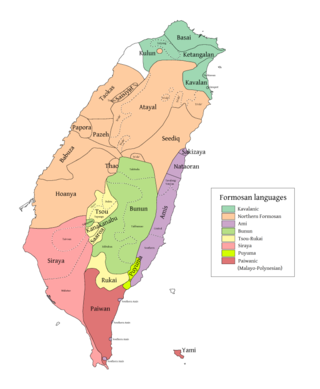
Summary
Sakizaya is a Formosan language closely related to Amis. One of the large family of Austronesian languages, it is spoken by the Sakizaya people, who are concentrated on the eastern Pacific coast of Taiwan. Since 2007 they have been recognized by the Taiwan government as one of the sixteen distinct indigenous groups on the island.
| Sakizaya | |
|---|---|
| Native to | Taiwan |
| Ethnicity | 990 Sakizaya (2020)[1] |
Native speakers | 590 (2020)[1] |
Austronesian
| |
| Language codes | |
| ISO 639-3 | szy |
| Glottolog | saki1247 |
| ELP | Sakizaya |
 (purple) Greater Ami. Nataoran and Sakizaya are in the north. | |
History edit
After the Takobowan incident of 1878, the Sakizaya people hid among the Nataoran Amis. Scholars mistakenly categorised the Sakizaya language as a dialect of Amis.
In 2002, the Center of Aboriginal Studies of National Chengchi University in Taiwan corrected this error when they edited the indigenous languages textbooks. That year, the Sakizaya language was designated both as a Chilai and Amis sublanguage. Both are included in the family of Austronesian languages.[2] On 17 January 2007, the Sakizaya community became the thirteenth distinct indigenous ethnic group recognised by the Taiwanese government.[3]
A total of 985 people are registered as Sakizaya.[4] They live primarily in the Takubuwan, Sakur, Maifor and Kaluluwan communities. Thousands of other Sakizaya are still registered as Amis, based on historic classifications. Around half of Amis politicians in Hualien City, the biggest city in the Amis area, are said to be ethnic Sakizaya.[citation needed]
See also edit
References edit
Bibliography edit
- Chen, Chun-nan 陳俊男 (2010). Sāqíláiyǎzú de shèhuì wénhuà yǔ mínzú rèndìng 撒奇萊雅族的社會文化與民族認定 [Study of Sakizaya Culture and Official Recognition] (PhD thesis) (in Chinese). Guoli zhengzhi daxue.
- Chen, Chun-nan 陳俊男 (1999). Qíláizú (Sakizayarén) de yánjiū 奇萊族(Sakizaya人)的研究 [The Study of Qilai (Sakizaya people)] (Master's thesis) (in Chinese). Guoli zhengzhi daxue.
- Lim, Siu-theh 林修澈. Sakizayazú de mínzú rèndìng: Qímò bàogào (Xíngzhèng Yuàn Yuánzhùmínzú Wěiyuánhuì wěituō) Sakizaya族的民族認定:期末報告(行政院原住民族委員會委託) [Sakizaya Nationality Identification: Final Report (Commissioned by the Indigenous Peoples Committee of the Executive Yuan)] (Report) (in Chinese). Taipei: Zhengzhi daxue minzu xuexi.
- Shen, Wen-chi 沈文琦 (2018). Sāqíláiyǎyǔ yǔfǎ gàilùn 撒奇萊雅語語法概論 [Introduction to Sakizaya Grammar] (in Chinese). Xinbei Shi: Yuanzhuminzu weiyuanhui. ISBN 978-986-05-5693-3 – via alilin.apc.gov.tw.
External links edit
- Yuánzhùmínzú yǔyán xiànshàng cídiǎn 原住民族語言線上詞典 (in Chinese) – Sakizaya search page at the "Aboriginal language online dictionary" website of the Indigenous Languages Research and Development Foundation
- Sakizaya teaching and leaning materials published by the Council of Indigenous Peoples of Taiwan (in Chinese)
- Sakizaya translation of President Tsai Ing-wen's 2016 apology to indigenous people – published on the website of the presidential office


